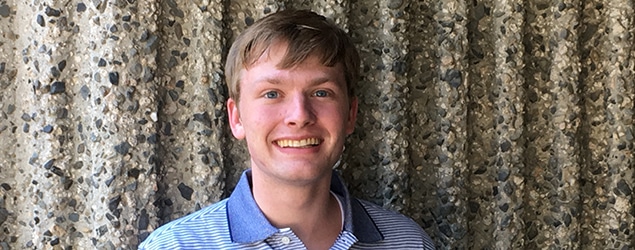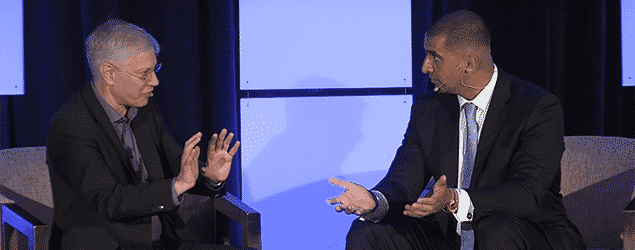Meet the Interns: Sam Weaver

Each year, the Ayn Rand Institute invites seasonal interns who help with projects and tasks while engaging in educational activities tailored to their knowledge of Rand’s ideas and their own research interests. This summer, in partnership with the Charles Koch Institute, five interns attended OCON in Pittsburgh and then came to work in our Southern California offices. An additional intern joined ARI from the Lion Rock Institute in Hong Kong. We are introducing them to you in this ongoing series.
Sam Weaver will be a senior this year at Davidson College in North Carolina, majoring in English and minoring in philosophy. He is also a second-year student in the Objectivist Academic Center. Weaver says that his studies “mainly involve English literature, though there’s a fair amount of writing, too. My minor is in philosophy, and I’m taking about as many classes there as in English these days, since I started my major early and my minor late.” Weaver was inspired to study English because “I’ve always been a passionate reader and writer, so great literature is very important to me,” and philosophy because Ayn Rand convinced him of the importance of the subject. Weaver is also interested in teaching “one or both of these subjects.”
We caught up with Weaver to talk about school, life and Ayn Rand.
What do you love about where you go to school?
One of the great things about going to a small liberal arts college is class size and the resulting role of professors. I love being in classes of ten to twenty, taught by professors — we have no teaching assistants — where there’s the ability to get to know the students and the professors well.
When did you first discover Ayn Rand?
I discovered Ayn Rand in middle school, when my teacher assigned Anthem as part of a special project on dystopian fiction. I loved that, unlike the other dystopias, Anthem provided a positive vision at the end. A few years later I read Atlas Shrugged, and things just grew from there.
Favorite Ayn Rand Character and why?
I think, right now, my answer is Dominique from The Fountainhead. I really relate to her struggle to work out the question of whether it makes sense to believe in a malevolent universe, and her transformation is inspiring. Hank Rearden in Atlas Shrugged has a similarly interesting journey. I’d also add that I think Ellsworth Toohey is Ayn Rand’s best villain.
How did you come to ARI?
I’ve been studying Objectivism for over five years now, and I’ve been aware of ARI for most of that time. I long wanted to do an ARI internship at some point during college, so it was an obvious choice for me to apply. I’m thrilled that I got in.
Favorite Ayn Rand quote?
“There is a fundamental conviction which some people never acquire, some hold only in their youth, and a few hold to the end of their days — the conviction that ideas matter . . . Its consequence is the inability to believe in the power or the triumph of evil.” [from “The Inexplicable Personal Alchemy” in Return of the Primitive: The Anti-Industrial Revolution]
Currently reading . . .
Les Miserables, which I’ve been working on for about a year now in between school and OAC readings. I’m almost at the end, finally! I’m usually reading more than one thing at a time, so right now I’m also reading Harry Binswanger’s How We Know, which is quite enlightening.
What’s on your playlist?
I have sort of eclectic music tastes. I’m a big fan of progressive rock and progressive metal, with my all-time favorite band being Dream Theater. But I also love good pop music — my favorite pop artist is Coldplay.
Best piece of advice you’ve ever gotten?
“God said, ‘Take what you want and pay for it.’” And not just that exact line from Ayn Rand, but that sort of message, which I’ve gotten in different forms from my very supportive parents and several of my favorite teachers.
What do you have to say to those reading Ayn Rand for the first time?
Take your time. These ideas are radical and they may be overwhelming at first. It’s easy to respond either by accepting everything on faith or dismissing it all as worthless, but neither one is a particularly productive response. Careful study is.



